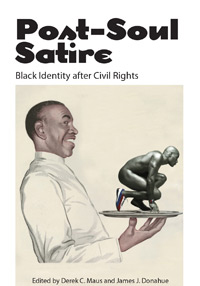Dr. Michael B. Gillespie, Assistant Professor in African American Studies, published an essay on “Dirty Pretty Things: The Racial Grotesque and Contemporary Art” in the new book Post-Soul Satire: Black Identity after Civil Rights, which is due out in July.
 Post-Soul Satire is edited by Derek Maus and Jim Donahue (University Press of Mississippi, 2014).
Post-Soul Satire is edited by Derek Maus and Jim Donahue (University Press of Mississippi, 2014).
Dr. Gillespie’s essay—”Dirty Pretty Things: The Racial Grotesque and Contemporary Art”—focuses on the idea of the racial grotesque and artwork by James Hannaham, Pierre Bennu, William Villalongo, Travis Somerville, and Jabari Dawolu Anderson.
From 30 Americans to Angry White Boy, from Bamboozled to The Boondocks, from Chappelle’s Show to The Colored Museum, Post-Soul Satire takes an interdisciplinary look at the flowering of satire and its influence in defining new roles in black identity. As a mode of expression for a generation of writers, comedians, cartoonists, musicians, filmmakers, and visual/conceptual artists, satire enables collective questioning of many of the fundamental presumptions about black identity in the wake of the civil rights movement. Whether taking place in popular and controversial television shows, in a provocative series of short internet films, in prize-winning novels and plays, in comic strips, or in conceptual hip-hop albums, this satirical impulse has found a receptive audience both within and outside the black community. Such works have been variously called “post-black,” “post-soul,” and examples of a “New Black Aesthetic.” Whatever the label, this collection bears witness to a noteworthy shift regarding the ways in which African American satirists feel constrained by conventional obligations when treating issues of racial identity, historical memory, and material representation of blackness. Read more about the book.


















Comments